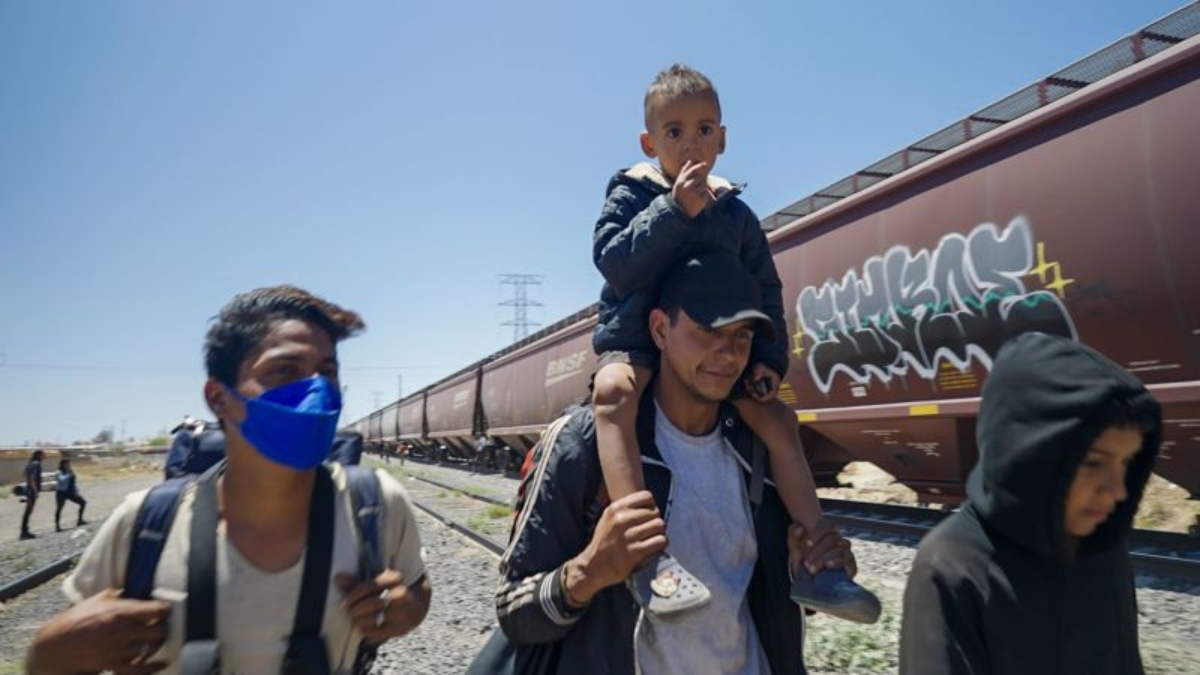Ciudad Juarez, Mexico (Trends Wide) — The freight train screeched to a stop and a few hundred people hoped that they were about to start a new phase of their lives.
A father of the family, Leuman Varela, told Trends Wide that he, his wife and their four children spent four days and four nights on top of the train, traveling hundreds of kilometers as they fled their native Venezuela.
“This is for the brave, this is hard,” he said, carrying his youngest son, Luca, on his shoulders. “Putting your family in danger is difficult, but God has been with us, he has helped us, he has given us strength,” he added.
People riding on the roofs of freight trains have no shelter from the scorching sun of the day or the brutal cold at night as they head north from southern Mexico to US border cities.
“We have been hungry, cold, hot, but here we are pursuing the American dream, a better life for our family,” said Varela.

Relatives help a woman get off the train after she got scared and couldn’t get off the roof. (Credit: Evelio Contreras/Trends Wide)
As they stepped out of the tanks and wagons in the border city of Ciudad Juárez, Mexico, many people smiled with apparent relief to be back on solid ground. They were some of the thousands who have arrived hoping to enter the United States, some aware that the pandemic-era immigration restriction, called Title 42, is about to end, but others not.
One mother was afraid: her legs were shaking as her husband and teenage children impatiently begged her to get off the train. They held her hand and were there to catch her when she finally walked down a metal ladder in her pink plastic sandals.
His son, Leonardo Luzardo, said it had been a long, cold night on top of the train, with the feeling that their bodies were turning to ice.
“It looked like we were going to freeze,” he told Trends Wide. “Frozen feet, frozen, the whole body frozen.”

A tented encampment along a street in Ciudad Juárez. (Credit: Evelio Contreras/Trends Wide)
Luzardo, from Chile, said he and his family would spend the night in Ciudad Juárez, which straddles the border near El Paso, Texas, and planned to cross into the United States the next day.
“We will try to shower and prepare so as not to be so dirty,” he explained.
Some aid groups and shelters offer food and facilities, but a hose spewing water near the tracks was a welcome welcome for a group of women who stopped to quench their thirst, wash their hands and faces of hours-long grime. to be on top of the train.
The Varela family, from Venezuela, said they would also be heading to the border after a restful night on their trip. They had managed to sign up for the CBP One app, launched by the US Customs and Border Protection (CBP) to give people the opportunity to get an appointment for an entry interview, by less if they had Internet access and were lucky enough to find an available space.

Janeysi Games sits under a blanket hanging from a shady wall in Ciudad Juárez. She says she wants to legally enter the United States with her husband and her four-year-old daughter, but she doesn’t know when she’ll get an appointment. (Credit: Evelio Contreras/Trends Wide)
The Varelas did not have an appointment, but they hope that a printout of the automated response they received by email — and which they have protected in a plastic bag — will be enough to help them get inside.
The focus of attention on the border has been renewed with the end of Title 42 and the policy that allowed the government to quickly turn away certain migrants who crossed the border, whose initial objective was to stop the spread of covid-19.
Some families told Trends Wide they have waited for months for the right time to enter the US, setting up makeshift tents on the streets of this border city in the meantime.
“I want to cross, but not illegally,” said Janeysi Games, who arrived in Ciudad Juárez with her husband and daughter after taking several trains.
A fire in Ciudad Juárez several weeks ago has further complicated matters, he said.

Janeysi Games does laundry with her daughter. (Credit: Evelio Contreras/Trends Wide)
“We are waiting to see how we can get an appointment through the CBP app,” she said as she did laundry with her daughter under a blanket tied to the wall to create some shade. “We were in a building that caught fire and I lost my documents and my cell phone, so I don’t know how to get the appointment,” she added.
For new arrivals on the freight train, there is still another 40 kilometers to the border.
And further along, for those planning to cross outside the border posts, there are coils and coils of electrical barbed wire, recently placed in the area by the Texas National Guard before a section of the border wall.
Two women approached the wire as Trends Wide watched. One used a jacket to remove the spikes while the other clawed her way through the dirt below. When the two finished, they hugged and walked off together, probably to turn themselves in to US border authorities.
The clothes caught and torn on the wire showed that they were not the first to pass. And with more and more people coming to Ciudad Juárez all the time, they won’t be the last.

A woman helps a colleague to crawl through a newly installed barbed wire at the US border. (Credit: Evelio Contreras / Trends Wide)
Evelio Contreras and Carlos Martinelli, both at Trends Wide, contributed to this story.
Ciudad Juarez, Mexico (Trends Wide) — The freight train screeched to a stop and a few hundred people hoped that they were about to start a new phase of their lives.
A father of the family, Leuman Varela, told Trends Wide that he, his wife and their four children spent four days and four nights on top of the train, traveling hundreds of kilometers as they fled their native Venezuela.
“This is for the brave, this is hard,” he said, carrying his youngest son, Luca, on his shoulders. “Putting your family in danger is difficult, but God has been with us, he has helped us, he has given us strength,” he added.
People riding on the roofs of freight trains have no shelter from the scorching sun of the day or the brutal cold at night as they head north from southern Mexico to US border cities.
“We have been hungry, cold, hot, but here we are pursuing the American dream, a better life for our family,” said Varela.

Relatives help a woman get off the train after she got scared and couldn’t get off the roof. (Credit: Evelio Contreras/Trends Wide)
As they stepped out of the tanks and wagons in the border city of Ciudad Juárez, Mexico, many people smiled with apparent relief to be back on solid ground. They were some of the thousands who have arrived hoping to enter the United States, some aware that the pandemic-era immigration restriction, called Title 42, is about to end, but others not.
One mother was afraid: her legs were shaking as her husband and teenage children impatiently begged her to get off the train. They held her hand and were there to catch her when she finally walked down a metal ladder in her pink plastic sandals.
His son, Leonardo Luzardo, said it had been a long, cold night on top of the train, with the feeling that their bodies were turning to ice.
“It looked like we were going to freeze,” he told Trends Wide. “Frozen feet, frozen, the whole body frozen.”

A tented encampment along a street in Ciudad Juárez. (Credit: Evelio Contreras/Trends Wide)
Luzardo, from Chile, said he and his family would spend the night in Ciudad Juárez, which straddles the border near El Paso, Texas, and planned to cross into the United States the next day.
“We will try to shower and prepare so as not to be so dirty,” he explained.
Some aid groups and shelters offer food and facilities, but a hose spewing water near the tracks was a welcome welcome for a group of women who stopped to quench their thirst, wash their hands and faces of hours-long grime. to be on top of the train.
The Varela family, from Venezuela, said they would also be heading to the border after a restful night on their trip. They had managed to sign up for the CBP One app, launched by the US Customs and Border Protection (CBP) to give people the opportunity to get an appointment for an entry interview, by less if they had Internet access and were lucky enough to find an available space.

Janeysi Games sits under a blanket hanging from a shady wall in Ciudad Juárez. She says she wants to legally enter the United States with her husband and her four-year-old daughter, but she doesn’t know when she’ll get an appointment. (Credit: Evelio Contreras/Trends Wide)
The Varelas did not have an appointment, but they hope that a printout of the automated response they received by email — and which they have protected in a plastic bag — will be enough to help them get inside.
The focus of attention on the border has been renewed with the end of Title 42 and the policy that allowed the government to quickly turn away certain migrants who crossed the border, whose initial objective was to stop the spread of covid-19.
Some families told Trends Wide they have waited for months for the right time to enter the US, setting up makeshift tents on the streets of this border city in the meantime.
“I want to cross, but not illegally,” said Janeysi Games, who arrived in Ciudad Juárez with her husband and daughter after taking several trains.
A fire in Ciudad Juárez several weeks ago has further complicated matters, he said.

Janeysi Games does laundry with her daughter. (Credit: Evelio Contreras/Trends Wide)
“We are waiting to see how we can get an appointment through the CBP app,” she said as she did laundry with her daughter under a blanket tied to the wall to create some shade. “We were in a building that caught fire and I lost my documents and my cell phone, so I don’t know how to get the appointment,” she added.
For new arrivals on the freight train, there is still another 40 kilometers to the border.
And further along, for those planning to cross outside the border posts, there are coils and coils of electrical barbed wire, recently placed in the area by the Texas National Guard before a section of the border wall.
Two women approached the wire as Trends Wide watched. One used a jacket to remove the spikes while the other clawed her way through the dirt below. When the two finished, they hugged and walked off together, probably to turn themselves in to US border authorities.
The clothes caught and torn on the wire showed that they were not the first to pass. And with more and more people coming to Ciudad Juárez all the time, they won’t be the last.

A woman helps a colleague to crawl through a newly installed barbed wire at the US border. (Credit: Evelio Contreras / Trends Wide)
Evelio Contreras and Carlos Martinelli, both at Trends Wide, contributed to this story.






